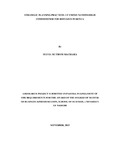| dc.description.abstract | Strategic planning is the cornerstone of every organization without which the
organization will never know where it is going or whether it will ever get there. While
strategic planning is important, what is of more importance is how it is practiced in
the different institutions or organizations. Different scholars and author have
advanced that strategic planning can be formed implicit as well as formulated
explicitly (Mintzerberg 1991 and Johnson and Scoles, 1993). While several studies
have been done in Kenya on the strategic planning practices, most of them have been
to general to elicit a comprehensive view on strategic planning practices adopted by
Institutions. This study was investigating the strategic planning practices at UNHCR
Kenya. The purpose of the study was to add on to the existing knowledge on strategic
planning practices at United Nations High Commissioner for Refugees in Kenya. This
research was a case study on Strategic Planning Practices at UNHCR Kenya. It also
sought to establish the challenges UNHCR Kenya has encountered in the strategic
planning process. The findings of this study will contribute to building the existing
body of knowledge on strategic planning process especially in the NGO sector. A case
study of strategic planning practices at UNHCR Kenya was carried out. Six senior
managers from various sections in the organization were involved. The study used
primary data sources collected through interviews conducted on the senior managers.
The data collection instrument used was an interview guide. The data collected from
the interviews was analysed through content analysis. The study found out that the
strategic planning process at UNHCR Kenya is clearly defined. The planning process
is well structured and accommodates input from all stakeholders in the refugee
operation. The roles of the stakeholders involved in the planning process is clearly
defined. The results of the study found out that there are challenges affecting the
strategic planning process at the organization. The study found that annual planning
and fiscal year cycle, the need to involve all stakeholders including donors, budgeting
and procurement lead times that need to be accommodated within the strictly on year
programming cycle dictated by the UNHCR mandate, donor priorities, composition of
beneficiaries, government policies and the political environment in the country and
region are some of the challenges encountered by the organization during the strategic
planning process, a fact that fitted the contextual argument. The study thus
recommended that given the reduced funding situation experience globally, the
funding situation dictates for more innovative ways of providing assistance to persons
of concern so that the organization and other stakeholders can achieve more with less.
The study also provides the organization with useful information on how to improve
the strategic planning practices in future by adopting innovative ways of providing
protection and assistance to PoC and also improving the monitoring and evaluation
within UNHCR Kenya by involving MFTs. The major limitation to this study was the
target respondents for the interviews who were senior managers who had limited time
for the interviews. The study recommends that further research should be done on
other International NGOs in the refugee operation so as to get comprehensive
information on how the players in the industry go about the process of strategic
planning. | en_US |

